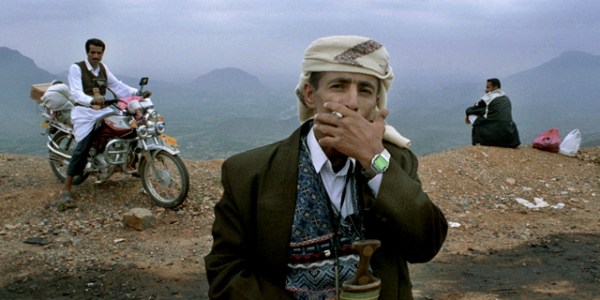The main opposition protest camp in Yemen's capital Sanaa came under heavy mortar and sniper attacks on Saturday, hours after President Ali Abdullah Saleh returned from a three-month absence, protesters and medical staff said.
At least 16 people were killed, a Yemeni medic said.
Medic Mohammed al-Qabatis said troops loyal to Saleh tried to storm the protesters' encampment in the early hours on Saturday. The camp on Change Square has been epicenter of Yemen's uprising and daily sit-ins to demand Saleh's ouster.
Al-Qabatis, who works at a field hospital set up in the camp, said the dead included 15 civilians and one soldier who had joined the opposition movement. He said 54 people were also wounded in the attack.
The latest bloodshed came a day after Saleh's sudden return to Yemen after more than three months of being treated in Saudi Arabia.
One witness said troops loyal to Saleh had carried out the assault and cleared thousands of protesters from the camp. The report could not be verified.
"They (the government forces) used armored vehicles and weapons, rifles. It was an intense fight ... My house was shaking like crazy ... There are no protesters there now — it's just armed people," said the witness, who lives near the camp.
Saleh said on his return to Yemen on Friday that he wanted to see a truce to end days of heavy fighting in the capital, but opponents said they feared more bloodshed and the United States demanded he relinquish power.
"I return to the nation carrying the dove of peace and the olive branch," Saleh was quoted as saying by state television.
Saleh, who went to neighboring Saudi Arabia for medical treatment in June when he suffered severe burns in an assassination attempt, said a cease-fire would enable peace talks to take place.
Questions over Yemen's future
His reappearance raised big questions over the future of the fractious Arabian Peninsula state, which has been paralyzed by protests against his 33-year rule since January.
In Washington, White House spokesman Jay Carney said: "We urge President Saleh to initiate a full transfer of power and arrange for presidential elections to be held before the end of then year.
"The Yemeni people have suffered enough and deserve a path toward a better future."
In Sanaa this week, a months-old standoff between loyalist troops and forces backing anti-Saleh protesters erupted into a full-blown battle that killed more than 100 people in five days.
Yemen, one of the region's poorest countries, also faces a worsening insurgency by al-Qaida militants, an uneasy truce with Shiite fighters in the north and separatism in the south.
Moments after state television's announcement of Saleh's return, Sanaa's streets erupted with bursts of gunfire and fireworks. Shelling occurred in the capital's Hasaba district.
Opponents saw his return as an attempt to rally for war and said they expected more bloodshed, while his supporters reacted with joy and said he could restore order.
"I'm so excited," said Akram al-Aghbari, a doorman. "He is an honorable and great man. I know he's coming to stop this terrible violence. People here without him only know how to rule with weapons, but with him back, just you watch."
Abdulghani al-Iryani, a political analyst and co-founder of the Democratic Awakening Movement, said violence lay ahead.
"This is an ominous sign. Returning at a time like this probably signals he intends to use violence to resolve this. This is dangerous," said Iryani.
"His people will feel that they are in a stronger position and they will refuse to compromise. Basically this means the political process is dead in the water."
Will Saleh sign accord?
Radio stations played celebratory music and thousands gathered at a pro-Saleh rally waving flags, beating drums and honking horns. A TV newsflash warned people not to fire into the air in celebration in case stray bullets hit bystanders.
In Sanaa's 70 square, a hub for pro-government Yemenis, the imam leading prayers said: "The president returned, the heart beat of Yemen returned, happiness returned, love returned, logic returned."
Many Yemenis thought they had seen the last of Saleh when he flew to Saudi Arabia in June for medical treatment after a bomb explosion at his palace left him with severe burns.
Slideshow 20 photos
Yemen in the spotlight
Saleh had been involved in negotiations mediated by Gulf states to leave office, repeatedly promising to step down only to change his position at the last minute.
The United States said on Friday it wanted Saleh to sign the accord promoted by the Gulf Cooperation Council.
Two members of Saleh's General People's Congress party denied opposition statements that his return spelled the end for the Gulf-brokered power transfer plan, which would see him hand interim power to Vice President Abd-Rabbu Mansour Hadi.
"This initiative remains effective and Hadi will continue the dialogue to create a binding mechanism to implement the Gulf initiative," Yasser al-Yamani told al-Jazeera television.
The Gulf initiative envisages Saleh standing down three months after signing it. He agreed three times to earlier drafts of the deal only to back out at the very last minute.
